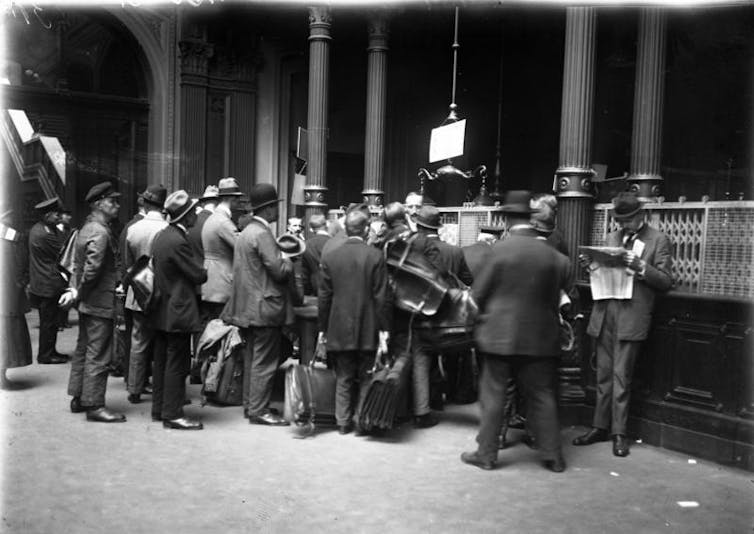By Steve Schifferes, Metropolis St George’s, College of London
That is the second in a two-part collection. Learn half one right here.
Globalisation has at all times had its critics – however till just lately, they’ve come primarily from the left moderately than the fitting.
Within the wake of the second world conflict, because the world economic system grew quickly below US dominance, many on the left argued that the positive aspects of globalisation have been unequally distributed, growing inequality in wealthy nations whereas forcing poorer nations to implement free-market insurance policies equivalent to opening up their monetary markets, privatising their state industries and rejecting expansionary fiscal insurance policies in favour of debt reimbursement – all of which primarily benefited US firms and banks.
This was not a brand new concern. Again in 1841, German economist Friedrich Checklist had argued that free commerce was designed to maintain Britain’s international dominance from being challenged, suggesting:
When anybody has obtained the summit of greatness, he kicks away the ladder by which he climbs up, with a purpose to deprive others of the technique of climbing up after him.
By the Nineteen Nineties, critics of the US imaginative and prescient of a worldwide world order such because the Nobel-winning economist Joseph Stiglitz argued that globalisation in its present type benefited the US on the expense of growing nations and employees – whereas creator and activist Naomi Klein centered on the destructive environmental and cultural penalties of the worldwide enlargement of multinational firms.
Mass left-led demonstrations broke out, disrupting international financial conferences together with, most famously, the World Commerce Group (WTO) in 1999. Throughout this “battle of Seattle”, violent exchanges between protesters and police prevented the launch of a brand new world commerce spherical that had been backed by then US president, Invoice Clinton. For some time, the mass mobilisation of a coalition of commerce unionists, environmentalists and anti-capitalist protesters appeared set to problem the trail in direction of additional globalisation – with anti-capitalism “Occupy” protests spreading world wide within the wake of the 2008 monetary crash.
Within the US, an additional critique of globalisation centred on its home penalties for American employees – specifically, job losses and decrease pay – and led to requires larger protectionism. Though initially led by commerce unions and a few Democratic politicians, this critique regularly gained buy in radical proper circles who opposed giving any function to worldwide organisations just like the WTO, on the grounds that they impinged on American sovereignty. In keeping with this view, solely by stopping international competitors whose low wages undercut American employees might prosperity be restored. Immigration was one other goal.
Below Donald Trump’s second time period as US president, these criticisms have been remodeled into radical, deeply disruptive financial and social insurance policies – with tariffs and protectionism at their coronary heart. In so doing, Trump – regardless of all his grandstanding on the world stage – has confirmed what has lengthy been clear to shut observers of US politics and enterprise: that the American century of worldwide dominance, with the greenback as unrivalled no.1 foreign money, is drawing quickly to an in depth.
Even earlier than Trump first took workplace in 2017, the US had begun to withdraw from its management function in worldwide financial establishments such because the WTO. Now, the strongest a part of its economic system, the hi-tech sector, is below intense strain from China, whose economic system is already larger than the US’s by one key measure of GDP. In the meantime, the vast majority of US residents are dealing with stagnant incomes, increased costs and extra insecure jobs.
In earlier centuries, when first France after which Nice Britain reached the top of their eras of world domination, these transitions had painful impacts past their borders. This time, with the worldwide economic system extra carefully built-in than ever earlier than and no single dominant energy ready within the wings to take over, the impacts may very well be felt much more extensively – with very damaging, if not catastrophic, outcomes.
Why nobody is able to take the US’s place
In relation to taking up from the US because the world’s main hegemonic energy, the one viable candidates with large enough economies are the European Union and China. However there are robust causes to doubt that both might tackle this function – however the truth that in 2022, then US president Joe Biden’s Nationwide Safety Technique referred to as China: “The one competitor with each the intent to reshape the worldwide order and, more and more, the financial, diplomatic, army and technological energy to take action.”
At instances Biden’s successor, President Trump, has sounded virtually jealous of the management China’s leaders exert over their nationwide economic system, and the very fact they don’t face elections and limits on their phrases in workplace. However a one-party, authoritarian political system which lacks authorized checks and balances is a key motive China will discover it exhausting to realize the cultural and political dominance amongst democratic nations that’s a part of attaining world no.1 standing – regardless of the affect it already wields in massive elements of Asia and Africa.
China nonetheless faces massive financial challenges too. Whereas it’s already the international chief in manufactured items (quickly transferring into hi-tech merchandise) and the world’s largest exporter, its economic system remains to be very unbalanced – with a a lot smaller shopper sector, a weak property market, many inefficient state industries which might be extremely indebted, and a comparatively small monetary sector restricted by state possession. Nor does China possess a worldwide foreign money, regardless of its (restricted) makes an attempt to make the renminbi a very worldwide foreign money.
The Insights part is dedicated to high-quality longform journalism. Our editors work with teachers from many various backgrounds who’re tackling a variety of societal and scientific challenges.
As I discovered on a reporting journey to Shanghai in 2007 to analyze the results of globalisation, there are additionally monumental variations between China’s affluent coastal megacities – whose essential thoroughfares rival New York and Paris – and the relative poverty within the inside, particularly in rural areas. However practically 20 years on from that go to, with the nation’s development fee slowing, many university-educated younger folks are additionally discovering it exhausting to search out well-paid jobs now.
In the meantime Europe – the one different contender to take the US’s place as international no.1 – is deeply politically divided, with smaller, weaker economies to the east and south way more sceptical about the advantages of globalisation, and more and more divided on points equivalent to migration and the Ukraine conflict. The challenges of attaining broad coverage settlement amongst all member states, and the issue of who can communicate for Europe, make it unlikely that the EU as at the moment constituted might provoke and implement a brand new international world order by itself.
The EU’s monetary system additionally lacks the heft of the US’s. Though it has a typical foreign money (the euro) managed by the European Central Financial institution, its monetary system is way extra fragmented. Banks are regulated nationally, and every nation points its personal authorities bonds (though a number of eurobonds now exist). This makes it exhausting for the euro to exchange the greenback as a retailer of worth, and reduces the inducement for foreigners to carry euros instead reserve foreign money.
In the meantime, any future prospects of a renewal of US international management look equally unpromising. Trump’s coverage of slicing taxes whereas growing the scale of the US authorities debt – which now stands at US$38 trillion, or 120% of GDP – threatens each the steadiness of the world economic system and the flexibility of the US to finance this mind-boggling deficit.
Tellingly, the Trump administration reveals little interest in reviving, and even partaking with, most of the worldwide monetary establishments which America as soon as dominated, and which helped form the world financial order – as US commerce consultant Jamieson Greer expressed disdainfully within the New York Instances just lately:
Our present, anonymous international order, which is dominated by the WTO and is notionally designed to pursue financial effectivity and regulate the commerce insurance policies of its 166 member nations, is untenable and unsustainable. The US has paid for this method with the lack of industrial jobs and financial safety, and the largest winner has been China.
Whereas the US just isn’t, to date, withdrawing from the IMF, the Trump administration has urged it to name out China for working such a big commerce surplus, whereas abandoning its concern about local weather change. Greer concluded that the US has “subordinated our nation’s financial and nationwide safety imperatives to a lowest frequent denominator of worldwide consensus”.
World with no international no.1
To grasp the potential risks forward, we should return greater than a century to the final time there was no international hegemon. By the point the primary world conflict formally ended with the signing of the Treaty of Versailles on June 28 1919, the worldwide financial order had collapsed. Britain, world chief over the earlier century, now not possessed the financial, political or army clout to implement its model of globalisation.
The UK authorities, burdened by the massive money owed it had taken out to finance the conflict effort, was pressured to make main cuts in public spending. In 1931, it confronted a sterling disaster: the pound needed to be devalued because the UK exited from the gold commonplace for good, regardless of having yielded to the calls for of worldwide bankers to chop funds to the unemployed. This was a ultimate signal that Britain had misplaced its dominant place on the planet financial order.
The Thirties have been a time of deep political unease and unrest in Britain and lots of different nations. In 1936, unemployed employees from Jarrow, a city in north-east England with 70% unemployment after its shipyards closed, organised a non-political “starvation march” to London which grew to become generally known as the Jarrow campaign. Greater than 200 males, dressed of their Sunday finest, marched peacefully in step for over 200 miles, gaining nice help alongside the way in which. But once they reached London, prime minister Stanley Baldwin ignored their petition – and the boys have been knowledgeable their dole cash can be docked as a result of that they had been unavailable for work over the previous fortnight.

Nationwide Media Museum/Wikimedia
Europe was additionally dealing with a extreme financial disaster. After Germany’s authorities refused to pay the reparations agreed within the 1919 Versailles treaty, saying they might bankrupt its economic system, the French military occupied the German industrial heartland of the Ruhr and German employees went on strike, supported by their authorities. The following wrestle fuelled hyperinflation in Germany. By November 1923, it took 200,000 million marks to purchase a loaf of bread, and the financial savings and pensions of the German center class have been worn out. That month, Adolf Hitler made his first try and seize energy within the failed “Beer corridor putsch” in Munich.
In distinction, throughout the Atlantic, the US was having fun with a interval of postwar prosperity, with a booming inventory market and explosive development of latest industries equivalent to automotive manufacturing. However regardless of rising because the world’s strongest financial energy, having financed a lot of the Allied conflict effort, it was unwilling to know the reins of worldwide financial management.
The Republican US Congress, having blocked President Woodrow Wilson’s plan for a League of Nations, as an alternative embraced isolationism and washed its fingers of Europe’s issues. The US refused to cancel and even scale back the conflict money owed owed it by the Allied nations, who ultimately repudiated their money owed. In retaliation, the US Congress banned all American banks from lending cash to those so-called allies.
Then, in 1929, the prosperous American “jazz age” got here to an abrupt halt with a inventory market crash that wiped off half its worth. The nation’s largest producer, Ford, closed its doorways for a 12 months and laid off all its employees. With 1 / 4 of the nation unemployed, lengthy strains for soup kitchens have been seen in each metropolis, whereas those that had been evicted camped out wherever they may – together with in New York’s Central Park, renamed “Hooverville” after the hapless US president of that point, Herbert Hoover.

Hmalcolm03/Wikimedia, CC BY-NC-ND
In rural areas the place the collapse in agricultural costs meant farmers might now not make a residing, armed farmers stopped meals and milk vehicles and destroyed their contents in a useless try and restrict provide and lift costs. By March 1933, as President Franklin D. Roosevelt took workplace, all the US banking system had floor to a standstill, with nobody capable of withdraw cash from their checking account.
With its give attention to this devastating Nice Melancholy, the US refused to get entangled in makes an attempt at worldwide financial cooperation. With no discover, Roosevelt withdrew from the 1933 London Convention which had been referred to as to stabilise the world’s currencies – sending a message denouncing “the outdated fetishes of the so-called worldwide bankers”.
With the US following the UK off the gold commonplace, the ensuing foreign money wars exacerbated the disaster and additional weakened European economies. As nations reverted to mercantilist insurance policies of protectionism and commerce wars, world commerce shrank dramatically.
The state of affairs grew to become even worse in central Europe, the place the collapse of the massive Credit score-Anstalt financial institution in Austria in 1931 reverberated across the area. In Germany, as mass unemployment soared, centrist events have been squeezed and armed riots broke out between communist and fascist supporters. When the Nazis got here to energy, they launched a coverage of autarky, slicing financial ties with the west to construct up their army machine.
The financial rivalries and antagonisms which weakened western economies paved the way in which for the rise of fascism in Germany. In some sense, Hitler – an admirer of the British empire – aspired to be the subsequent hegemonic financial in addition to army energy, creating his personal empire by conquering and ruthlessly exploiting the sources of the remainder of Europe.

Bundesarchiv/Wikimedia, CC BY-NC-SA
Almost a century later, there are some disturbing parallels with that interwar interval. Like America after the primary world conflict, Trump insists that nations the US has supported militarily now owe it cash for this safety. He needs to encourage foreign money wars by devaluing the greenback, and lift protectionist boundaries to guard home trade. The Twenties was additionally a time when the US sharply restricted immigration on eugenic grounds, solely permitting it from northern European nations which (the eugenicists argued) wouldn’t “pollute the white race”.
Clearly, Trump doesn’t view the dearth of worldwide cooperation that would amplify the damaging financial results of a inventory or bond market crash as an issue that ought to concern him. And in immediately’s unstable world, for all of the US’s previous failings as a worldwide chief, that could be a very worrying proposition.
How the US responded to the final monetary disaster
As soon as once more, the principles of the worldwide order are breaking down. Whereas it’s potential that Trump’s strategy won’t be totally adopted by his successor within the White Home, the route of journey within the US will virtually definitely stay sceptical about the advantages of globalisation, with restricted help for any worldwide financial guidelines or initiatives.
We see comparable scepticism about the advantages of globalisation rising in different nations, amid the rise of rightwing populist events in a lot of Europe and South America – many backed by Trump. Fuelling these events’ help are rising considerations about revenue inequality, gradual development and immigration that are not being addressed by the present political system – and all of which might be exacerbated by the onset of a brand new international financial disaster.
With the worldwide economic system and monetary system far larger than ever earlier than, a brand new disaster may very well be much more extreme than the one which occurred in 2008, when the failure of the banking system left the world teetering on the point of collapse.
The dimensions of this disaster was unprecedented, however key US and UK authorities officers moved boldly and swiftly. As a BBC reporter in Washington, I attended the Home of Representatives’ Monetary Companies Committee listening to three days after Lehman Brothers went bankrupt, paralysing the worldwide monetary system, to search out out the administration’s response. I keep in mind the surprised look on the face of the committee’s chairman, Barney Frank, when he requested US Treasury secretary Hank Paulson and US Federal Reserve chairman Ben Bernanke how a lot cash they could have to stabilise the state of affairs:
“Let’s begin with US$1 trillion,” Bernanke replied coolly. “However we have now one other US$2 trillion on our steadiness sheet if we’d like it.”
Shortly afterwards, the US Congress accredited a US$700 billion rescue package deal. Whereas the worldwide economic system has nonetheless not totally recovered from this disaster, it might have been far worse – probably as dangerous because the Thirties – with out such intervention.
World wide, governments ended up pledging US$11 trillion to ensure the solvency of their banking techniques, with the UK authorities placing up a sum equal to the nation’s total yearly GDP. However it was not simply governments. On the G20 summit in London in April 2009, a brand new US$1.1 trillion fund was arrange by the Worldwide Financial Fund (IMF) to advance cash to nations that have been moving into monetary issue.
The G20 additionally agreed to impose harder regulatory requirements for banks and different monetary establishments that may apply globally, to exchange the weak regulation of banks that had been one of many essential causes of the disaster. As a reporter at this summit, I recall widespread pleasure and optimism that the world was lastly working collectively to sort out its international issues, with the host prime minister, Gordon Brown, briefly glowing within the limelight as organiser of that summit.
Behind the scenes, the US Federal Reserve had additionally been working to include the disaster by quietly passing on to the world’s different main central banks practically US$600 billion in “foreign money swaps” to make sure that they had the {dollars} they wanted to bail out their very own banking techniques. The Financial institution of England secretly lent UK banks £100 billion to make sure they didn’t collapse, though two of the 4 main banks, Royal Financial institution of Scotland (now NatWest) and Lloyds, in the end needed to be nationalised (to completely different extents) to maintain the monetary system steady.
Nevertheless, these rescue packages for banks, whereas a lot wanted to stabilise the worldwide economic system, didn’t lengthen to most of the victims of the crash – such because the 12 million US households whose properties have been now value lower than the mortgage that they had taken out to pay for them, or the 40% of households who skilled monetary misery in the course of the 18 months after the crash. And the ramifications of the disaster have been even larger for these residing in growing nations.
A number of months after the 2008 monetary disaster started, I travelled to Zambia, an African nation completely depending on copper exports for its international alternate. I visited the Luanshya copper mine close to Ndola within the nation’s copper belt. With demand for copper (used primarily in building and automotive manufacturing) collapsing, all of the copper mines had closed. Their employees, in one of many few well-paid jobs in Zambia, have been pressured to go away their comfy firm properties and return to sharing with their family in Lusaka with out pay.
Zambia’s authorities was pressured to close down its deliberate poverty discount plan, which was to be funded by mining income. The collapse in exports additionally broken the Zambian foreign money, which dropped sharply. This hit the nation’s poorest folks exhausting because it raised the worth of meals, most of which was imported.

Nerin Engineering Co., CC BY-SA
I additionally visited a flower farm close to Lusaka, the place Dutch expats Angelique and Watze Elsinga had been rising roses for export for over a decade – using greater than 200 employees who got housing and training. As the marketplace for Valentine’s Day roses collapsed, their bankers, Barclays South Africa, all of the sudden ordered them to instantly repay all their loans, forcing them to promote their farm and dismiss their employees. Finally, it took a US$3.9 billion mortgage from the IMF and World Financial institution to stabilise Zambia’s economic system.
Ought to one other international monetary disaster hit, it’s exhausting to see the Trump administration (and others that observe) being as sympathetic to the plight of growing nations, or permitting the Federal Reserve to lend main sums to international central banks – until it’s a nation politically aligned with Trump, equivalent to Argentina. Least probably of all is the thought of Trump working with different nations to develop a worldwide trillion-dollar rescue package deal to assist save the world economic system.
Relatively, there’s a actual fear that reckless actions by the Trump administration – and weak international regulation of economic markets – might set off the subsequent international monetary disaster.
What occurs if the US bond market collapses?
Financial historians agree that monetary crises are endemic within the historical past of worldwide capitalism, and so they have been growing in frequency for the reason that “hyper-globalisation” of the Seventies. From Latin America’s debt disaster within the Nineteen Eighties to the Asia foreign money disaster within the late Nineteen Nineties and the US dotcom inventory market collapse within the early 2000s, crises have commonly devastated economies and areas world wide.
At this time, the best danger is the collapse of the US Treasury bond market, which underpins the worldwide monetary system and is concerned in 70% of worldwide monetary transactions by banks and different monetary establishments. World wide, these establishments have lengthy regarded the US bond market, value over $30 trillion, as a secure haven, as a result of these “debt securities” are backed by the US central financial institution, the Federal Reserve.
More and more, the unregulated “shadow banking system” – a sector now bigger than regulated international banks – is deeply concerned within the bond market. Non-bank monetary establishments equivalent to non-public fairness, hedge funds, enterprise capital and pension funds are largely unregulated and, in contrast to banks, will not be required to carry reserves.
Bond market jitters are already unnerving international monetary markets, which concern its unravelling might precipitate a banking disaster on the size of 2008 – with extremely leveraged transactions by these non-bank monetary establishments leaving them uncovered.
Consumers of US bonds are additionally troubled by the Trump administration’s plan to increase the US deficit even increased to pay for tax cuts – with the nationwide debt now forecast to rise to 134% of US GDP by 2035, up from 120% in 2025. Ought to this result in a widespread refusal to purchase extra US bonds amongst jittery traders, their worth would collapse and rates of interest – each within the US and globally – would soar.
The governor of the Financial institution of England, Andrew Bailey, just lately warned that the state of affairs has “worrying echoes of the 2008 monetary disaster”, whereas the pinnacle of the IMF, Kristalina Georgieva, mentioned her worries in regards to the collapse of personal credit score markets generally maintain her awake at evening.
A foul state of affairs would develop even worse if issues within the bond market precipitate a pointy decline within the worth of the greenback. The world’s “anchor foreign money” would now not be seen as a secure retailer of worth – resulting in extra withdrawals of funds from the US Treasury bond market, the place many international governments maintain their reserves.
A weaker greenback would additionally make imported items dearer for US shoppers, whereas probably boosting the nation’s exports. That is exactly the plan of action advocated by Stephen Miran, chair of the US president’s Council of Financial Advisors – who Trump seems to wish to be the subsequent head of the Federal Reserve.
One instance of what might occur if bond markets grow to be destabilised occurred when the shortest-lived prime minister in UK historical past, Liz Truss, introduced large unfunded tax cuts in her 2022 price range, inflicting the worth of UK gilts (the equal of US Treasury bonds) to plummet as rates of interest spiked. Inside days, the Financial institution of England was pressured to place up an emergency £60 billion rescue fund to keep away from main UK pension funds collapsing.
Within the case of a US bond market crash, nevertheless, there are rising fears that the US authorities can be unable – and unwilling – to step in to mitigate such injury.
A brand new period of economic chaos
Simply as worrying can be a crash of the US inventory market – which, by historic requirements, is at the moment vastly overvalued.
Big current will increase within the US inventory market’s general worth have been pushed virtually fully by the “magnificent seven” hi-tech firms, which alone make up a 3rd of its whole worth. If their massive guess on synthetic intelligence just isn’t as profitable as they declare, or is overshadowed by the success of China’s AI techniques, a pointy downturn, much like the dotcom crash of 2000-02, might effectively happen.
Jamie Dimon, head of the US’s greatest financial institution JPMorgan Chase, has mentioned he’s “way more fearful than different [experts]” a few critical market correction, which he warned might come within the subsequent six months to 2 years.
Large tech executives have been overoptimistic earlier than. Reporting from Silicon Valley in 2001 because the dotcom bubble was bursting, I used to be struck by the unshakeable perception of web startup CEOs that their share costs might solely go up.
Moreover, their firms’ excessive inventory valuations had allowed them to take over their rivals, thus limiting competitors – simply as firms equivalent to Google and Meta (Fb) have since used their extremely valued shares to buy key property and potential rivals together with YouTube, WhatsApp, Instagram and DeepMind. Historical past suggests that is at all times dangerous for the economic system in the long term.
With the enterprise and monetary worlds now ever extra carefully linked, not solely has the frequency of economic crises elevated within the final half-century, every disaster has grow to be extra interconnected. The 2008 international monetary disaster confirmed how harmful this may be: a worldwide banking disaster triggered inventory market falls, collapses within the worth of weak currencies, a debt disaster in growing nations – and in the end, a worldwide recession that has taken years to get well from.
The IMF’s newest monetary stability report summarised the state of affairs in worrying phrases, highlighting “elevated” stability dangers on account of “stretched asset valuations, rising strain in sovereign bond markets, and the growing function of non-bank monetary establishments. Regardless of its deep liquidity, the worldwide international alternate market stays weak to macrofinancial uncertainty.”
I imagine we could also be coming into a brand new period of sustained monetary chaos throughout which the seeds sown by the demise of globalisation – and Trump’s response to it – lastly shatter the world financial and political order established after the second world conflict.
Trump’s excessive and erratically utilized tariffs – aimed most strongly at China – have already made it troublesome to reconfigure international provide chains. Much more worrying may very well be the wrestle over the management of key strategic uncooked supplies just like the uncommon earth minerals wanted for hi-tech industries, with China banning their export and the US threatening 100% tariffs in return (in addition to hoping to take over Greenland, with its as-yet-untapped provide of a few of these minerals).
This battle over uncommon earths, important for the pc chips wanted for AI, might additionally threaten the market worth of high-flying tech shares equivalent to Nvidia, the primary firm to exceed US$4 trillion in worth.
The battle for management of crucial uncooked supplies might escalate. There’s a hazard that in some instances, commerce wars may grow to be actual wars – simply as they did within the former period of mercantilism. Many current and present regional conflicts, from the primary Iraq conflict aimed on the conquest of the oilfields of Kuwait, to the civil conflict in Sudan over management of the nation’s goldmines, are rooted in financial conflicts.
The historical past of globalisation over the previous 4 centuries means that the presence of a worldwide superpower – for all its destructive sides – has introduced a level of financial stability in an unsure world.
In distinction, a key lesson of historical past is {that a} return to insurance policies of mercantilism – with nations struggling to grab key pure sources for themselves and deny them to their rivals – is more than likely a recipe for perpetual battle. However this time round, in a world stuffed with 10,000 nuclear weapons, miscalculations may very well be deadly if belief and certainty are undermined.
The challenges forward are immense – and the weak point of worldwide establishments, the restricted visions of most governments and the alienation of a lot of their residents will not be optimistic indicators.
That is the second in a two-part collection. In case you missed it, learn half one right here.
Concerning the Writer:Steve Schifferes, Honorary Analysis Fellow, Metropolis Political Economic system Analysis Centre, Metropolis St George’s, College of London
This text is republished from The Dialog below a Inventive Commons license. Learn the authentic article.

